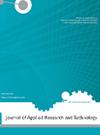Improving the optimization of electric power systems through a discrete event based simulation model
Q3 Engineering
Journal of Applied Research and Technology
Pub Date : 2023-02-21
DOI:10.22201/icat.24486736e.2023.21.1.2167
引用次数: 1
Abstract
This paper presents a novel hybrid approach for studying electric power systems as a combination of the electrical power generation process and the actual state of the transmission lines. The approach is composed of a discrete-event simulation model and a mathematical programming model. The simulation model is designed as a routing problem defined over a set of transmission lines considered (individually) as active, inactive, under maintenance, and outage. On the other hand, the mixed-integer lineal programming model determines the best way to generate and transmit power flows (considering, simultaneously, all possible solutions). This type of model allows solving the economic dispatch problem in lower computational times. It also ensures reaching the global optimum. When adding the discrete-event simulation model for studying the state of transmission lines, the final hybrid approach allows obtaining feasible solutions when the system parameters change. Here, both models (i.e., simulation and optimization models) are combined to improve the capabilities of the model structure to represent real-life scenarios. Our proposal is used to analyze a case study composed of an electric system with six buses, eleven lines, and three generators.通过基于离散事件的仿真模型改进电力系统的优化
本文提出了一种将发电过程与输电线路实际状态相结合的研究电力系统的新型混合方法。该方法由离散事件仿真模型和数学规划模型组成。仿真模型被设计为在一组传输线上定义的路由问题,这些传输线分别被认为是活动的、不活动的、处于维护状态的和中断的。另一方面,混合整数线性规划模型确定了产生和传输潮流的最佳方式(同时考虑所有可能的解决方案)。这种模型可以在较短的计算时间内解决经济调度问题。它还确保达到全局最优。当加入离散事件仿真模型来研究输电线路的状态时,最终的混合方法可以在系统参数变化时获得可行的解。在这里,将两种模型(即仿真模型和优化模型)结合起来,以提高模型结构表示现实场景的能力。我们的提案是用来分析一个由6个总线,11条线路和3个发电机组成的电力系统的案例研究。
本文章由计算机程序翻译,如有差异,请以英文原文为准。
求助全文
约1分钟内获得全文
求助全文
来源期刊

Journal of Applied Research and Technology
工程技术-工程:电子与电气
CiteScore
1.50
自引率
0.00%
发文量
0
审稿时长
6-12 weeks
期刊介绍:
The Journal of Applied Research and Technology (JART) is a bimonthly open access journal that publishes papers on innovative applications, development of new technologies and efficient solutions in engineering, computing and scientific research. JART publishes manuscripts describing original research, with significant results based on experimental, theoretical and numerical work.
The journal does not charge for submission, processing, publication of manuscripts or for color reproduction of photographs.
JART classifies research into the following main fields:
-Material Science:
Biomaterials, carbon, ceramics, composite, metals, polymers, thin films, functional materials and semiconductors.
-Computer Science:
Computer graphics and visualization, programming, human-computer interaction, neural networks, image processing and software engineering.
-Industrial Engineering:
Operations research, systems engineering, management science, complex systems and cybernetics applications and information technologies
-Electronic Engineering:
Solid-state physics, radio engineering, telecommunications, control systems, signal processing, power electronics, electronic devices and circuits and automation.
-Instrumentation engineering and science:
Measurement devices (pressure, temperature, flow, voltage, frequency etc.), precision engineering, medical devices, instrumentation for education (devices and software), sensor technology, mechatronics and robotics.
 求助内容:
求助内容: 应助结果提醒方式:
应助结果提醒方式:


